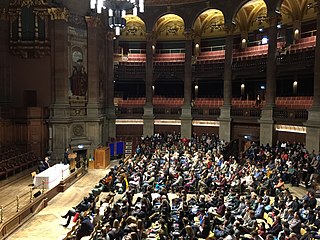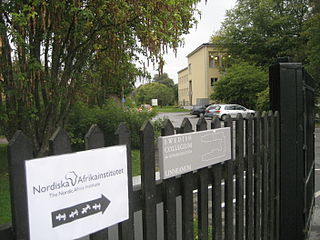 W
WAfrican studies is the study of Africa, especially the continent's cultures and societies. The field includes the study of Africa's history, demography, culture, politics, economy, languages, and religion. A specialist in African studies is often referred to as an "africanist". A key focus of the discipline is to interrogate epistemological approaches, theories and methods in traditional disciplines using a critical lens that inserts African-centred ways of knowing and references.
 W
WAEGIS is a research network of European centres in African studies, which aims to create synergies between experts and institutions. With primary emphasis on Social Sciences and Humanities, AEGIS' main goal is to improve understanding about contemporary African societies.
 W
WThe African Studies Centre (Afrika-Studiecentrum) is a scientific institute in the Netherlands that undertakes social-science research on Africa with the aim of promoting a better understanding of historical, current and future social developments in Sub-Saharan Africa. The centre is an interfaculty institute of Leiden University. The present director is Marleen Dekker. The institute is located in the Pieter de la Court Building of Leiden University’s Faculty of Social Sciences.
 W
WThe Afrobarometer is a pan-African, independent, non-partisan research network that measures public attitudes on economic, political, and social matters in Africa. Its secretariat headquarters are in Accra, Ghana, registered as a limited company by guarantee by the Registrar-General’s Department.
 W
WSome African objects had been collected by Europeans for centuries, and there had been industries producing some types, especially carvings in ivory, for European markets in some coastal regions. Between 1890 and 1918 the volume of objects greatly increased as Western colonial expansion in Africa led to the removal of many pieces of sub-Saharan African art that were subsequently brought to Europe and displayed. These objects entered the collections of natural history museums, art museums and private collections in Europe and the United States.
 W
WBill Bryson's African Diary is a 2002 book by bestselling travel writer Bill Bryson. The book details a trip Bryson took to Kenya in 2002. Bryson describes his experiences there and observations about Kenyan culture, geography, and politics, as well as his visits to poverty-fighting projects run by CARE International, to which he donated all royalties for the book.
 W
WThe Council for the Development of Social Science Research in Africa (CODESRIA) is Pan-African research organisation headquartered in Dakar, Senegal. The current President of CODESRIA is Dzodzi Tsikata.
 W
WEgyptology is the study of ancient Egyptian history, language, literature, religion, architecture and art from the 5th millennium BC until the end of its native religious practices in the 4th century AD. A practitioner of the discipline is an "Egyptologist". In Europe, particularly on the Continent, Egyptology is primarily regarded as being a philological discipline, while in North America it is often regarded as a branch of archaeology.
 W
WThe Internet Library Sub-saharan Africa (ilissAfrica) is a German Internet portal that offers an integrated access to relevant scientific information resources in the field of African Studies and the region Africa South of the Sahara. ilissAfrica covers social sciences, history, philology, ethnology and cultural studies. The website is presented in German, English and French.
 W
WThe Institute of Asian and African Countries at Lomonosov Moscow State University was founded in 1956 as the Institute of Oriental Languages and was renamed to the Institute of Asian and African Countries in 1972. It is the leading Russian Centre for Oriental Studies. It employs more than 250 members including 28 professors and 70 assistant professors. Many of them are well known as authors of fundamental studies, text-books and dictionaries for their translations of Japanese, Chinese, Sanskrit, Arabic, Hindi, Persian, Malay, Swahili and other Oriental and African texts of fiction. Nowadays a lot of Asian and African languages are taught in the Institute: Chinese, Japanese, Korean, Vietnamese, Thai, Mongolian, Arabic, Sinhalese, Turkish, Hebrew, Urdu, Sanskrit and Swahili, Hausa, Amharic, Afrikaans, Fula and Zulu.
 W
WNordic Africa Institute serves as a research, documentation and information centre on modern Africa for the Nordic countries. The Institute also encourages research and studies on Africa. The institute was founded in 1962.
 W
WRace Against Time: Searching for Hope in AIDS-Ravaged Africa is a non-fiction book written by Stephen Lewis for the Massey Lectures. Lewis wrote it in early to mid-2005 and House of Anansi Press released it as the lecture series began in October 2005. Each of the book's chapters was delivered as one lecture in a different Canadian city, beginning in Vancouver on October 18 and ending in Toronto on October 28. The speeches were aired on CBC Radio One between November 7 and 11. The author and orator, Stephen Lewis, was at that time the United Nations Special Envoy for HIV/AIDS in Africa and former Canadian ambassador to the United Nations. Although he wrote the book and lectures in his role as a concerned Canadian citizen, his criticism of the United Nations (UN), international organizations, and other diplomats, including naming specific people, was called undiplomatic and led several reviewers to speculate whether he would be removed from his UN position.
 W
WSOAS University of London is a public research university in London, England, and a constituent college of the federal University of London. Founded in 1916, SOAS is located in the Bloomsbury area of central London.
 W
WSomali studies is the scholarly term for research concerning Somalis and Greater Somalia. It consists of several disciplines such as anthropology, sociology, linguistics, historiography and archaeology. The field draws from old Somali chronicles, records and oral literature, in addition to written accounts and traditions about Somalis from explorers and geographers in the Horn of Africa and the Middle East. The Somali Studies International Association is the primary organization for Somalist scholars. Bildhaan, Somali Studies, Horn of Africa and the Anglo-Somali Society Journal likewise serve as the field's main periodicals. Since 1980, prominent Somalist scholars from around the world have also gathered annually to hold the International Congress of Somali Studies.
 W
WUniversity of Florida Center for African Studies (CAS) is a center within of the College of Liberal Arts and Sciences (CLAS) at the University of Florida (UF). The Center provides teaching and research into issues of African languages, humanities, social sciences, agriculture, business, engineering, education, fine arts, environmental studies, conservation, journalism, and law.
 W
WRaymond Arnold Winbush aka Tikari Bioko is an American-African scholar and activist known for his systems-thinking approaches to understanding the impact of racism/white supremacy on the global African community. His writings, consultations, and research have been instrumental in understanding developmental stages in Black males, public policy and its connection to compensatory justice, relationships between Black males and females, infusion of African studies into school curricula, and the impact of hip hop culture on the contemporary American landscape. He is currently Research Professor and Director of the Institute for Urban Research at Morgan State University in Baltimore, Maryland.